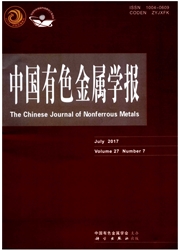

 中文摘要:
中文摘要:
研究超声波辐射对兰坪低品位氧化锌矿氨浸过程的影响规律。研究表明:无超声波辐射时,兰坪低品位氧化锌矿在NH3-NH4Cl-H2O体系中浸出3h后的最高浸出率为69.4%;引入超声波辐射后,显著缩短了浸出时间,无超声波辐射时Zn浸出率达到61.8%需要80min,而采用超声波辐射浸出时仅需20min;反应温度、浸出剂浓度和NH4Cl与NH4OH的摩尔浓度比等参数对超声波辐射的强化作用效果显著。当反应温度和浸出剂浓度较低,NH4Cl与NH4OH的摩尔浓度比较大时,超声波辐射的强化作用显著;超声波辐射可望降低氨浸低品位氧化锌矿的反应温度和浸出所需NH4OH浓度,大幅缩短浸出时间;同时,超声强化氨浸对锌的浸出具有较高选择性。
 英文摘要:
英文摘要:
The influence of ultrasonic irradiation on the ammonia leaching of zinc from low-grate oxide zinc ore from Lanping was studied. The results show that the maximum leaching rate of zinc is 69.4% in NH3-NHnCl-H2O solution for 3 h in the absence of ultrasonic. The ultrasonic can shorten the reaction time obviously. The leaching rate of 61.8% is obtained in just 20 min with ultrasonic irradiation while it needs 80 min in leaching process without ultrasonic irradiation. The influence of ultrasonic irradiation on the zinc leaching process is strongly related to the reaction temperature, leaching agent concentration, as well as molar concentration ratio of NH4Cl to NH4OH. The influence of ultrasonic irradiation on the zinc leaching process is obvious at lower temperature, lower leaching agent concentration, and higher molar concentration ratio of NH4Cl to NH4OH, so it is expected to decrease the reaction temperature, molar concentration of NH4OH and obviously shorten the reaction time with ultrasonic irradiation. At the same time, the selectivity to zinc leaching is high in ultrasonic intensified ammonia leaching process of low-grade oxide zinc ore.
 同期刊论文项目
同期刊论文项目
 同项目期刊论文
同项目期刊论文
 期刊信息
期刊信息
